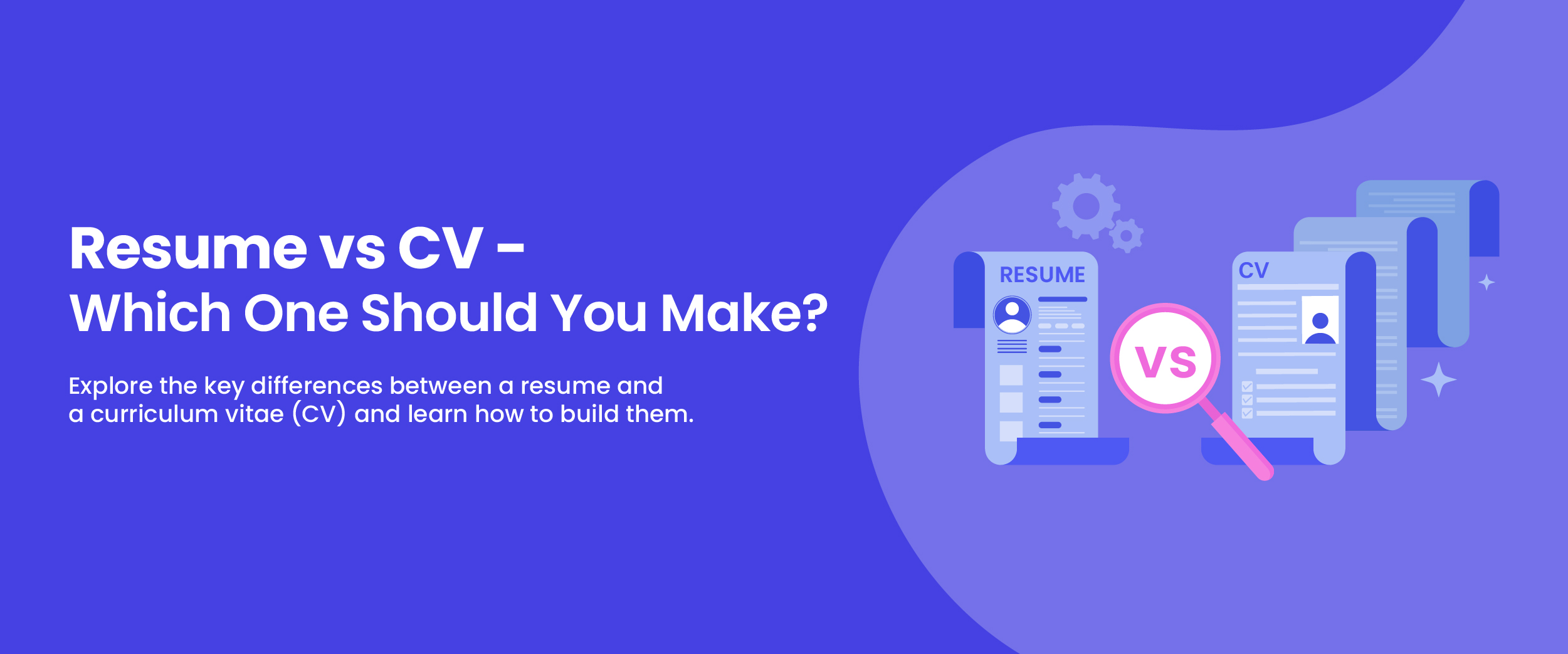CV Vs Resume: Explore The Key Differences

Are you confused between a CV and a resume? Do you not know the difference between these two important documents needed during the application process? Buckle up because this comprehensive comparison of CV vs resume will walk you through the essential elements that you need to know about both documents. This blog will cover all the important factors that a CV and resume should cover and will also provide you with appropriate samples of both.
What is a Resume?
A resume is a document that a candidate shares with the company during the application process. It provides a summary of all the professional experiences that the candidate has. It includes achievements, skills, and qualifications. They are the first document that the reviewer checks to see if you fit the position.
Its main objective is to showcase your professional background, experience in the field, and skills. A well-crafted resume should be able to convey all the highlighted points that you want the reviewers to notice first. You must remember that emphasizing your latest accomplishments will increase your chances of getting selected.
What to Add to a Resume?
A well-crafted resume should include the following details:
- Contact Information- You must put your contact information clearly, it will reflect professionalism and the employer will not have a hard time getting back to you.
- Professional Summary- Start your resume with a professional summary. It is the first section and it should mandatorily be attention-grabbing. Do not prolong the important points as it might break the interest of the employer.
- Education and Qualifications- Follow up your professional summary with your education and qualifications. Try to link the courses and certifications that are relevant to the job profile.
- Work Experience- Put the experiences that you have gained in the field to make your document look more customizable and your interest seem more prominent for the position you are applying for,
- Skills- Do not forget to add the skills that you think are relevant to the role you are applying for. It will urge the employer to give a minute to your candidature and think thoroughly.
- Achievements- In the end, try to sum up your personal or professional achievements that will align with the role that you are applying for. It will provide support to your resume and the employer will think in a broader perspective.
To understand a resume better, take a look at this resume for computer science jobs.
What is a CV?
A CV also known as a Curriculum Vitae means ‘course of life’ in Latin. It indicates that this document presents a detailed version of your academic and professional achievements. It offers a full history of a candidate’s academic and professional background. They are quite elaborate when compared to resumes which only provide a summary of all the activities that the candidate was involved in.
The CVs are generally used in the process of hiring postdoctoral positions, grants, and teachers or professors. It is usually considered a more trusted document as it highlights all the important and necessary information that the employer or an institute might be searching for in a candidate.
What to Add to a CV?
The following points explain what you should be adding to a CV to make it look well-presented and attentively crafted:
- Contact Detail- Try to include your personal information like contact details so that the employer can reach out to you easily.
- Objective- Write about your professional objective in a detailed manner. Explain what you are looking for from the new opportunity.
- Educational Background- Emphasize your educational background, explain your major, and why you chose to study it. Bring out the interests that you pursued during your studies that align with the job profile. Remember the length of the CV should not be very long but it must include all all the required information in an elaborate format.
- Skills- List your skills that match the job description and you think would help in the mutual growth.
- Training and Certificates- Present all the information about certification and pieces of training in chronological order and try to be descriptive about all the information.
- Publications- Write your publications and presentations as it will work as a plus point and will give the employer an insight into your research skills.
- Volunteering Experience- You can also include your volunteering experiences as it will highlight your qualities of teamwork, dedication, and empathy.
- References- Do not forget to provide references as they can work a big time in increasing your chances of getting selected.
What Is the Difference Between a CV and a Resume?
- Length- The key difference between a resume and a CV is in length. A CV is a document that is generally written in 3 or more pages. It is a long document that has in-depth details of your education, experience, and achievements. While a resume is a concise summary that is mainly written in a maximum length of 2 pages. It provides a summary of your education, skills, or experience.
- Static and Dynamic- A CV is a static document that does not change with the position that you are applying for. While a resume is a highly customizable document where you, depending on the type of internship/job you are applying for, may choose to highlight one particular aspect over another.
- Use- A CV is mostly used while applying for academic positions, research positions, fellowships, grants, etc. While a resume is used everywhere else, like corporate jobs, and positions like managerial posts. It is more commonly used in USA and Canada while a European employer seems to prefer a CV.
Which One Should You Use From Curriculum Vitae vs Resume?
This section will provide you an insight into what will suit you best when you choose from a CV and resume.
- Students: If you are a student applying to an internship, then there could be a huge CV and resume difference as you will not have an ample amount of content to write about. Hence, it will be the right step to either choose a resume or make a hybrid document that is about 2 pages in length and will cover your most important achievements and experiences. If you happen to apply to companies individually, do spend time customizing your resume as per the company and profile you are applying to.
- Professional: If you are an experienced candidate that holds a good experience of about 8-10 years then you will have no shortage of content to provide details about. Although it is up to you and the job title to choose the document that you will be applying with. You can undoubtedly go for a detailed CV, as you can emphasize all the work experience that you have gained in the field. It also depends on the job that you are applying for, pay close attention to the companies hiring process and try to select between resume and CV accordingly.
Conclusion
Now that you know the difference between a CV and a resume, make sure you use the correct document in your next job application. Don’t know where to find good opportunities? If you need any help looking for internships or job opportunities, register at Internshala and start your career with fresher jobs.



